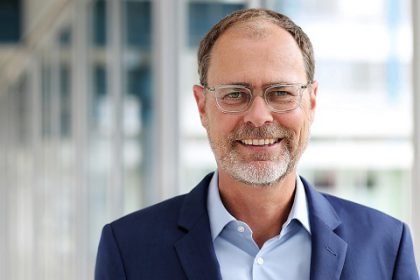K 2019 will take place in Düsseldorf from 16 to 23 October. This time, VDMA is putting the spotlight on circular economy. The reason why the issue is so important for the member companies of VDMA Plastics and Rubber Machinery is explained in our interview series. In the first contributions, Ulrich Reifenhäuser (left image above), Chairman of the Board, and Thorsten Kühmann ( right Image), Managing Director of the association, will speak.
“Closed loops can solve the littering problem.”
Thorsten Kühmann is convinced that the plastics industry can offer solutions that help to eliminate the environmental problems caused by plastic waste. The guiding principle is circular economy. The global challenges for circular economy in the plastics industry are economic efficiency, political and regulatory constraints, quality standards and availability of recyclates and especially the establishment of functioning waste collection systems worldwide.
VDMA will shine the spotlight on circular economy at the leading K 2019 trade fair in Düsseldorf in October and show how closed loops can work effectively.
Q: Why is VDMA putting the spotlight on circular economy in its presentation at K 2019?
Thorsten Kühmann: We are doing this because we have realised that we’re facing an image problem when it comes to plastics. Nowadays, plastics usually only attract public attention when causing problems, polluting the environment or being suspected of endangering our health. Images and reports of how plastic waste is littering our oceans and the countryside are ever-present. These are serious problems indeed, and the industry needs to offer solutions. We want to use K 2019 as an opportunity to show what needs to be done to avoid these waste problems and the resulting damage. We will demonstrate that closed loops are a possible solution.
Q: What can visitors see at K 2019?
Thorsten Kühmann: We’re pursuing two goals. At our exhibition pavilion, we will firstly present the entire cycle of circular economy in the plastics industry, from production via the use phase of plastics products to collecting, sorting, recycling and the subsequent return to production. Our second goal is to make our visitors experience circular economy. To achieve this, we will be working with partners from the entire plastics value chain at the trade fair, including raw material suppliers, processors and recyclers, and will demonstrate how a closed loop works. At K 2019, it should become clear that the plastics industry is taking care of the waste problem and that it already has proposals for effective solutions.
Q: What are the biggest challenges in the practical implementation of circular economy?
Thorsten Kühmann: There are several challenges. It’s extremely important to bear in mind that cycles can only function well if they are profitable. Many plastics processors currently use virgin material rather than recycled material, simply because it’s cheaper. At the end of the day, the consumer usually goes for the cheaper product in the supermarket. Those who use recycled materials would lose out because their products would be more expensive and thus left on the shelves. In order to increase the use of recycled materials, fixed quotas are needed so that everyone has the same starting conditions. The EU Plastics Directive also provides for quotas like this. Companies therefore need a new business model. The other challenge is to create reliable quality standards for recycled materials.
These don’t currently exist which means that those who use recyclates never really know exactly what quality they are getting. This makes the processes less secure: If material quality fluctuates, production cannot be controlled as reliably as with standardised new materials. Recycled materials would be much easier to accept if they were standardised.
And finally, there is a problem with quantity. Those who are currently prepared to use recyclates, do not know whether they will actually be able to obtain the quantities they require over a longer period of a few years.
Q: Is everything that is needed for the circular economy feasible from a technological perspective?
Thorsten Kühmann: There are still matters that need to be clarified. But there are already technological solutions for standard processes such as sorting, shredding and recycling. There will certainly be improvements in that regard.
Technology is not the main problem in the plastics recycling industry.
Q: What role does product design play?
Thorsten Kühmann: Product design must be approached in a different way in the circular economy. Until now, products have followed a design, but it has been all about functionality and ultimately appearance. There has been no obligation or consistent practice for a sound eco-design. In fact, all products, including plastics products, should be checked in terms of their recyclability. At the moment, this is not happening. It’s neither a requirement, nor common practice. Of course, it would help if products were designed in a recyclable way in the first place.
Q: Europe is only responsible for a mere fraction of the plastic waste in our oceans. Will consistently focusing on a circular economy here even make any kind of difference?
Thorsten Kühmann: Awareness of the waste problem in the world’s oceans is particularly high in Europe. As a result, the image of plastics is suffering, especially in Germany. It is true that the Helmholtz Centre for Environmental
Research has discovered that 90 percent of annual marine pollution is caused by plastics from ten rivers in Asia and Africa, but the problem affects us all. Just think of microplastics in fish. That’s why people here are concerned. A circular economy in Europe means setting a good example. We can show other countries how it works and that it does indeed work. Usually, the main problem is a lack of or inadequate waste management. Without waste management, however, there can be no circular economy. We would like our systems to be adapted throughout the world. Not necessarily to match each other one-for-one, but to be used as guidance. This is why we are
showcasing them at K 2019 and why it is good to drive them forward in Europe. The task is extremely complex. It has taken us years to get to where we are now, but other regions don’t have so much time. It really is time to act now by
learning from those who are already doing it.
—————–
 In our world, plastics are indispensable. The downside is the littering. Carelessly discarded plastics products condense to form thick carpets, not just on rivers and seas, but also on land. A complete circular economy could prevent this evil and put the focus back on the benefits of plastics. In order for this to be a success, we all need to work together: processors, raw material manufacturers, mechanical engineers and recyclers, but also brand owners, end consumers and politicians.
In our world, plastics are indispensable. The downside is the littering. Carelessly discarded plastics products condense to form thick carpets, not just on rivers and seas, but also on land. A complete circular economy could prevent this evil and put the focus back on the benefits of plastics. In order for this to be a success, we all need to work together: processors, raw material manufacturers, mechanical engineers and recyclers, but also brand owners, end consumers and politicians.
VDMA will shine the spotlight on circular economy at the leading K 2019 trade fair in Düsseldorf in October and show how closed loops can work effectively. Throughout the process, stakeholders will be having their say in a series of interviews in the run-up to this international industry event.
Above Image: Ulrich Reifenhauser
************************
Why Should Be “A Paid-Subscriber” and “Advertiser”
Keeping an independent media in countries that impose limitations on self supporting media, will help to support the humankind’s freedom. If you believe it, please act to be a PRO-MEMBER by clicking “HERE“, or:
Please send your PR’s directly to the email address of the Chief-Editor in order to be published at once in the world via ” http://pimi.ir ” The address is: aasaatnia@live.com.















